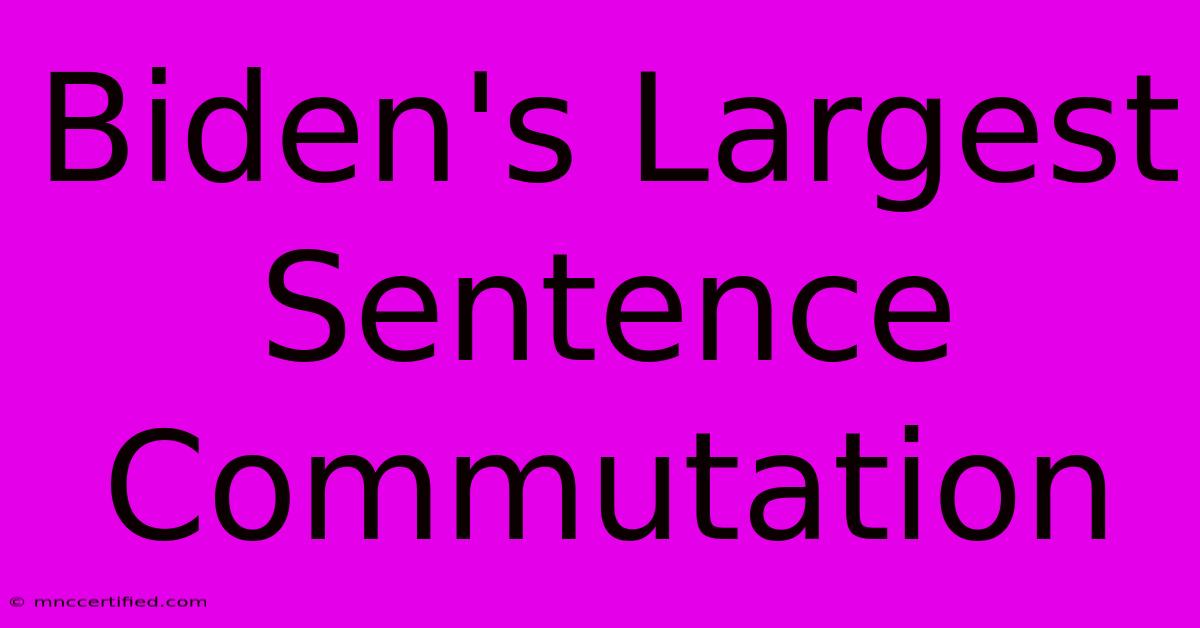Biden's Largest Sentence Commutation

Table of Contents
Biden's Largest Sentence Commutation: A Deep Dive into the Case of Julius Jones
President Biden's commutation of Julius Jones's sentence in November 2021 stands as one of the most significant clemency actions of his presidency, sparking widespread debate and highlighting the complexities of the American justice system. This article delves into the details of the case, exploring the arguments for and against commutation, and analyzing its broader implications.
The Julius Jones Case: A Summary of the Controversies
Julius Jones, a Black man, was convicted in 2002 of the murder of Paul Howell, a white man, in Edmond, Oklahoma. The case was fraught with controversy from the outset, with accusations of:
- Insufficient Evidence: Critics argued the prosecution relied heavily on questionable eyewitness testimony and lacked substantial physical evidence directly linking Jones to the crime.
- Racial Bias: Concerns were raised about potential racial bias in the jury selection process and the overall handling of the case. This became a central point in arguments for commutation.
- Doubtful Testimony: Key witnesses recanted or altered their testimonies over time, further fueling doubts about the conviction's validity.
- Ineffective Counsel: Claims of ineffective legal representation during Jones's original trial added another layer of complexity to the case, casting doubt on the fairness of the proceedings.
The Arguments for Commutation
The campaign to free Julius Jones garnered significant support from celebrities, activists, and politicians. Arguments in favor of commutation often centered on:
- Serious doubts about guilt: The cumulative effect of questionable evidence, recanted testimony, and ineffective counsel created reasonable doubt about Jones's guilt.
- Racial injustice: The case became a symbol of systemic racial bias within the criminal justice system, highlighting disparities in sentencing and the disproportionate incarceration of Black individuals.
- Mitigation of sentence: Even if Jones were partially culpable, supporters argued that life imprisonment without parole was a disproportionate punishment given the circumstances of the case. This argument emphasized the need for a more humane and rehabilitative approach to sentencing.
- Clemency as a mechanism for justice: Advocates highlighted the importance of presidential clemency as a tool to correct potential judicial errors and address injustices within the system.
The Arguments Against Commutation
Opponents of commutation often stressed:
- Conviction upheld on appeal: Despite numerous appeals and challenges, Jones's conviction was repeatedly upheld by Oklahoma courts. This underscored the existing judicial processes and their findings.
- Victim's family's objections: The family of the victim, Paul Howell, consistently opposed Jones's release, highlighting the emotional toll of the crime and their belief in his guilt. This aspect is crucial in understanding the public reaction and political considerations involved.
- Public safety concerns: Some argued that releasing Jones, regardless of the doubts surrounding his guilt, would pose a risk to public safety. This concern often overshadows other aspects of the case.
The Impact and Implications of Biden's Decision
President Biden's commutation of Jones's sentence to time served marked a significant intervention in the case. The decision reflected a growing national conversation about criminal justice reform, racial justice, and the use of executive clemency. Its implications include:
- Increased scrutiny of death penalty cases: The case prompted renewed scrutiny of capital punishment cases, particularly those involving questionable evidence or allegations of racial bias.
- Heightened public awareness: The extensive media coverage of the Jones case brought broader public awareness to issues of wrongful convictions and systemic injustice within the American criminal justice system.
- Political ramifications: Biden's decision held significant political weight, reflecting his administration's stance on criminal justice reform and potentially influencing future clemency decisions.
Conclusion: A Case Study in Clemency and Justice
The commutation of Julius Jones's sentence remains a complex and controversial case, highlighting the ongoing struggle for justice and reform within the American legal system. The debate surrounding this decision continues to fuel conversations about evidence standards, racial bias in the justice system, and the appropriate role of executive clemency in rectifying potential injustices. It serves as a powerful case study in the intersection of law, politics, and social justice.

Thank you for visiting our website wich cover about Biden's Largest Sentence Commutation. We hope the information provided has been useful to you. Feel free to contact us if you have any questions or need further assistance. See you next time and dont miss to bookmark.
Featured Posts
-
Astro Bot Game Awards 2024 Winner
Dec 13, 2024
-
Tamil Nadu Cm Funds Chess Win
Dec 13, 2024
-
Asian Hornets Jerseys Essential Defence
Dec 13, 2024
-
Game Awards 2024 Witcher 4 Elden Ring Dlc
Dec 13, 2024
-
De Vondre Campbell Shanahans Statement
Dec 13, 2024